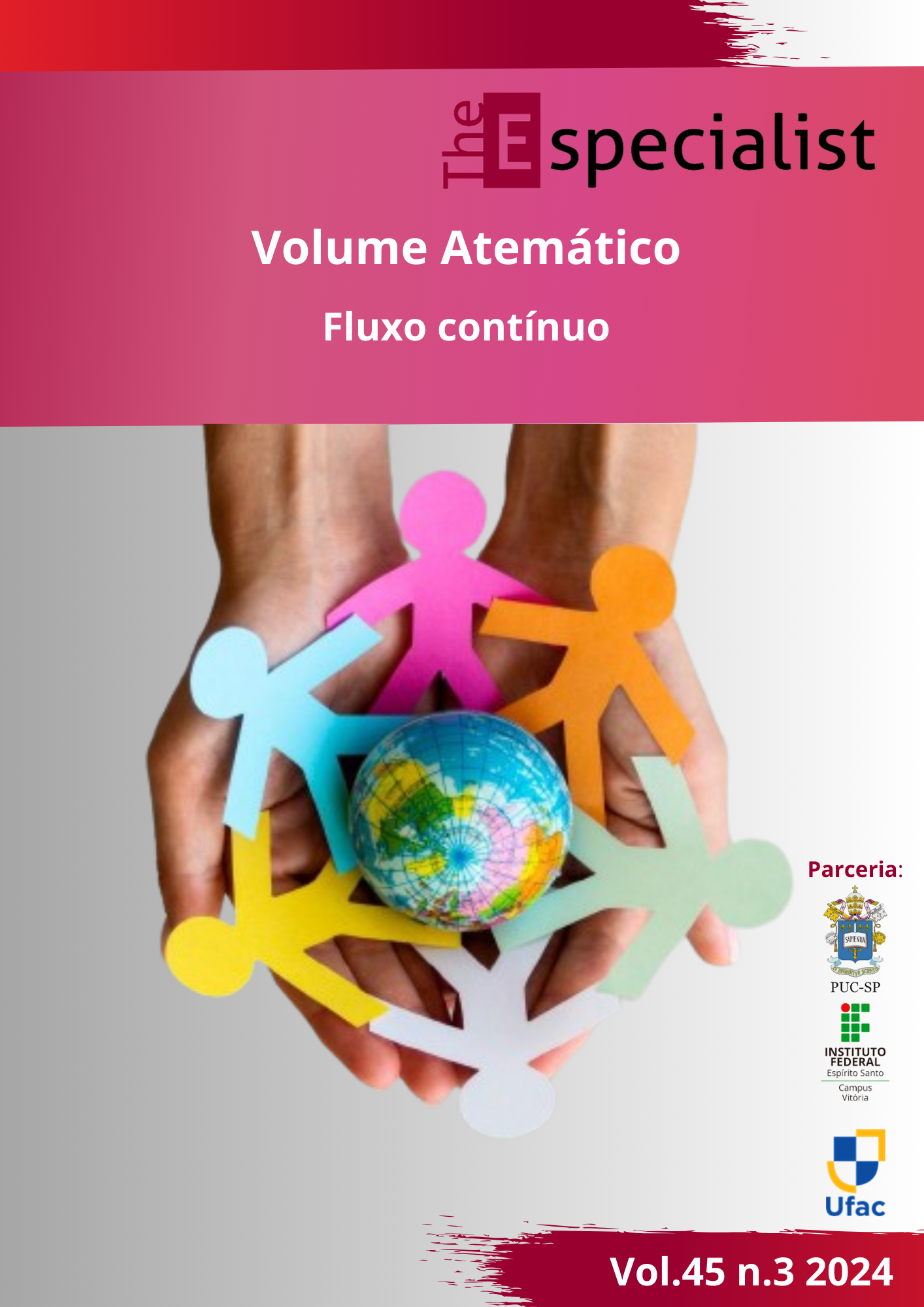Problematizando a noção de imersão em letramentos digitais no contexto da pandemia de COVID-19
DOI:
https://doi.org/10.23925/2318-7115.2024v45i3e64561Palavras-chave:
Letramentos Digitais, Práticas letradas digitais, Estágio de Língua Inglesa, Ensino remoto, COVID-19Resumo
Este artigo objetiva analisar e discutir as práticas letradas digitais de licenciandos durante a realização do estágio supervisionado obrigatório no período de setembro a dezembro de 2020 do curso de Letras – Língua Inglesa, de uma universidade pública localizada no interior do Nordeste. Devido à pandemia de COVID-19, o componente de Estágio de Língua Inglesa: 3º ano do Ensino Médio ocorreu de maneira completamente remota, por meio de tecnologias digitais. Para o enfoque teórico-metodológico deste estudo, selecionamos alguns dados e focalizamos especialmente no entendimento dos estagiários sobre a noção de imersão em letramentos digitais durante a execução das etapas constituintes do estágio. Após a análise dos dados, foi possível constatar que, diante do fato de que a maioria dos estagiários afirmou que não houve imersão em letramentos digitais neste período, a apreensão das práticas letradas realizadas se coaduna com a perspectiva autônoma, referindo-se à noção de desenvolvimento de habilidades, neste caso, com os aparatos e recursos digitais, opondo-se à perspectiva sociocultural e ideológica (Buzato, 2006; Kleiman, 1995; Lankshear, Knobel, 2011; Street, 1986, 2010, 2012).
Referências
BAUMAN, Zygmunt. Identidade: entrevista a Benedetto Vecchi. Tradução Carlos Alberto Medeiros. Rio de Janeiro: Jorge Zahar Ed., 2005.
BORTONI-RICARDO, Stella Maris. O professor pesquisador: introdução à pesquisa qualitativa. São Paulo: Parábola Editorial, 2008.
BUZATO, Marcelo El Khouri. Letramentos digitais e formação de professores. In: CONGRESSO IBERO-AMERICANO EDUCAREDE: EDUCAÇÃO, INTERNET E OPORTUNIDADES, 3, 2006, São Paulo. Anais[...]. São Paulo: CENPEC, 2006. p. 1-13.
CORACINI, Maria José. Pós-modernidade e novas tecnologias – no discurso do professor de línguas. In: CORACINI, Maria José. A celebração do outro: arquivo, memória e identidade – línguas (materna e estrangeira), plurilinguismo e tradução. Campinas: Mercado de Letras, 2007. p. 209-224.
FLICK, Uwe. Designing quatitative research. Los Angeles: Sage, 2007.
HALL, Stuart. Quem precisa da identidade? In: SILVA, Tomaz Tadeu (Org.). Identidade e diferença: a perspectiva dos estudos culturais. Petrópolis, RJ: Vozes, 2000. p. 103-133.
HELLER, Monica. Paths to post-nationalism: a critical ethnography of language and identity. Oxford University Press, 2011.
HODGES, Charles; MOORE, Stephanie; LOCKEE, Barb; TRUST, Torrey; BOND, Aaron. The difference between emergency remote teaching and online learning. EDUCAUSE Review. 2020. Disponível em: https://er.educause.edu/articles/2020/3/the-difference-between-emergency-remote-teaching-and-online-learning. Acesso em: 19 mai. 2023.
KLEIMAN, Angela Bustos. Introdução: modelos de letramento e as práticas de alfabetização na escola. In: KLEIMAN, Angela Bustos (Org.). Os significados do letramento: uma nova perspectiva sobre a prática social da escrita. Campinas: Mercado de Letras, 1995. p. 15-61.
LANKSHEAR, Colin; KNOBEL, Michele. Digital literacy and digital literacies: policy, pedagogy and research considerations for education. Nordic Journal of Digital Literacy, Norway, v. 1, p. 12-24, 2006.
LANKSHEAR, Colin; KNOBEL, Michele. New literacies. 3 ed. New York, Mc Graw Hill Open University Press, 2011.
MARCUSCHI, Luiz Antônio. Análise da conversação. São Paulo: Editora Ática, 2000.
MOITA LOPES, Luiz Paulo da. Uma linguística aplicada mestiça e ideológica: interrogando o campo como linguista aplicado. In: MOITA LOPES, Luiz Paulo (Org.). Por uma linguística aplicada indisciplinar. Parábola, 2006. p. 13-44.
MONTE MÓR, Walkyria Maria. Linguagem digital e interpretação: perspectivas epistemológicas. Trab. Ling. Aplic., v. 46, n. 1, p. 31-44, 2007.
MONTE MÓR, Walkyria Maria. Multimodalidades e comunicação: antigas novas questões no ensino de línguas estrangeiras. Letras & Letras, v. 26, p. 469-478, 2010.
MORAN, José Manuel. Educação que desejamos: novos desafios e como chegar lá. 5. ed. Campinas: Papirus, 2012.
OLIVEIRA, Derli Machado de; ALMEIDA, Danielle Barbosa Lins de. Recursos semióticos de enquadramento e a ressignificação espacial/interacional em tempos de pandemia da covid-19 no contexto educacional. Revista Investigações, v. 33, n. 2, p. 1-20, 2020.
SILVA, Tomaz Tadeu. A produção social da identidade e da diferença. In: SILVA, Tomaz Tadeu (Org.). Identidade e diferença: a perspectiva dos estudos culturais. Petrópolis, RJ: Vozes, 2000. p. 73-102.
STREET, Brian. Literacy in Theory and Practice. Cambridge: Cambridge University Press, 1984.
STREET, Brian. Cross-cultural approaches to literacy. Cambridge: Cambridge University Press, 1993.
STREET, Brian. What´s “new” in New Literacy Studies? Critical approaches to literacy in theory and practice. Current Issues in Comparative Educacion, v. 5, n. 2, p. 77-91, 2003.
STREET, Brian. Os novos estudos sobre o Letramento: histórico e perspectivas. In: MARINHO, Marildes; CARVALHO, Gilcinei Teodoro (ed.). Cultura escrita e Letramento. Belo Horizonte: UFMG, 2010. p. 33-53.
STREET, Brian. Eventos de letramento e práticas de letramento: teoria e prática nos Novos Estudos de letramento. In: MAGALHÃES, Izabel (Org.). Discursos e práticas de letramento: pesquisa etnográfica e formação de professores. Campina, SP: Mercado de Letras, 2012. p. 69-92.
VAN LEEUWEN, Theo. Introducing Social Semiotics. London, New York: Routledge, 2005.
VIANNA, Carolina Assis Dias; SITO; Luanda; VALSECHI, Marília Curado; PEREIRA, Sílvia Letícia Matievicz. Do letramento aos letramentos: desafios na aproximação entre letramento acadêmico e letramento do professor. In: KLEIMAN, Angela Bustos; ASSIS, Juliana Alves (Org.). Significados e ressignificações do letramento: desdobramentos de uma perspectiva sociocultural sobre a escrita. Campinas, SP: Mercado de Letras, 2016, p. 27-59.
XAVIER, Manassés Morais; SERAFIM, Maria Lúcia. O WhatsApp impactando novas possibilidades de ensinar e de aprender no contexto acadêmico. Campina Grande: Mentes Abertas, 2020.
Downloads
Publicado
Como Citar
Edição
Seção
Licença
Copyright (c) 2024 The Especialist

Este trabalho está licenciado sob uma licença Creative Commons Attribution 4.0 International License.
Os autores concedem à revista todos os direitos autorais referentes aos trabalhos publicados. Os conceitos emitidos em artigos assinados são de absoluta e exclusiva responsabilidade de seus autores.


 Esta obra está licenciada com uma Licença
Esta obra está licenciada com uma Licença 

